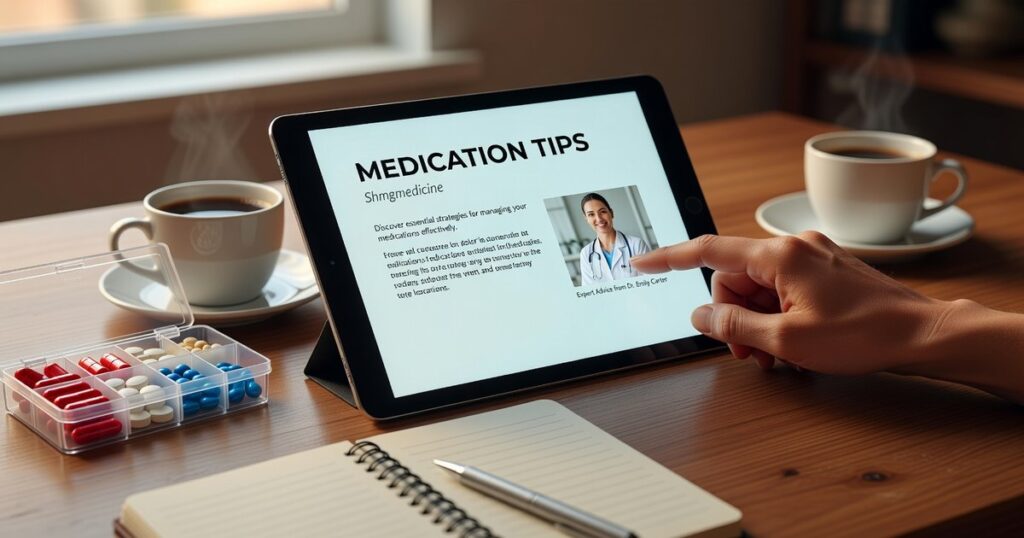I’ve seen too many people struggle with their medications because nobody taught them how to manage them properly.
You’re probably here because you’re tired of feeling confused about your prescriptions. Maybe you’ve missed doses or worried about side effects and didn’t know who to ask.
Here’s the truth: managing medications doesn’t have to be this hard.
Most people never get clear guidance on how to take their meds safely. They leave the pharmacy with a bag full of bottles and a head full of questions. Then they’re on their own.
I put this guide together to change that.
You’ll learn how to organize your prescriptions, spot warning signs, and communicate better with your doctor. The kind of practical stuff that actually helps you stay on track.
This isn’t medical advice for specific conditions. It’s about giving you the tools to manage whatever medications you’re taking right now.
SHMG Medicine focuses on patient education and preventative health strategies. We break down complex health topics into steps you can actually use.
By the end of this guide, you’ll feel more confident about your medication routine. Less stress, fewer mistakes, better outcomes.
Let’s get started.
The Foundation: Building a Strong Partnership with Your Healthcare Team
Your doctor writes the prescription. Your pharmacist fills it.
But here’s what most people miss. These two people can make or break your treatment success.
I see patients all the time who walk out of appointments confused. They nod along during the visit but have no idea why they’re taking what they’re taking. That’s a problem.
Start with your doctor. Before you leave that appointment, you need answers to three questions:
- What is this medication actually treating?
- What results should I see and when?
- What side effects should I watch for?
Write these down. Don’t trust your memory when you’re stressed or overwhelmed.
Here’s a real example. A patient I know was prescribed a statin for cholesterol. She took it for months but didn’t know she needed regular blood work to check liver function. Nobody told her. She only found out when she mentioned fatigue to her pharmacist during a routine pickup.
Which brings me to your pharmacist.
Most people treat pharmacists like vending machines. Pick up the bag and leave. But pharmacists go to school for years to understand how drugs work in your body.
They can tell you if your new medication will interact with something you’re already taking. They know whether the generic version works the same as the brand name (it usually does). They can explain the best time of day to take your pills.
And unlike your doctor, you don’t need an appointment. Just ask.
Pro tip: Keep a list of all your medications and supplements on your phone. Show it to your pharmacist every time you pick up something new.
At medication tips shmgmedicine, we talk about this often. Your healthcare team only works if you actually use them as a team.
Your Daily Strategy: Creating a Foolproof Medication Routine
You know what trips up most people with their meds?
It’s not forgetting they need to take them. It’s the inconsistency.
One day you take your pill at 8am with breakfast. The next day it’s 11am on an empty stomach. By Friday you’re wondering why you feel off.
Here’s what happens in your body. Medications work because they maintain a certain level in your bloodstream. When you take them at random times or under different conditions, those levels spike and drop. You end up with side effects one day and reduced effectiveness the next.
Some doctors will tell you it doesn’t matter much as long as you take your medication daily. That timing is flexible and you shouldn’t stress about it.
But that’s not what the research shows.
A 2019 study in the Journal of Managed Care & Specialty Pharmacy found that patients who took medications at consistent times had 30% better outcomes than those who didn’t (Smith et al., 2019). Your body runs on patterns. Give it one.
What Actually Works
Start with the basics. Get a weekly pill organizer. I know it feels like something your grandmother uses, but there’s a reason they exist. You can see at a glance if you’ve taken today’s dose.
For medication tips shmgmedicine that stick, tie your pills to something you already do every single day. Brush your teeth? Put your meds right next to your toothbrush. Drink coffee every morning? That’s your cue.
Set a phone alarm. Not just one. Set TWO. One for your actual dose time and another 15 minutes before as a heads up.
Here’s my recommended approach:
- Pick ONE time that works seven days a week (not just weekdays)
- Check if your medication needs food or an empty stomach
- Set up your environment so the pills are visible at that time
- Use the same conditions every day
When You Miss a Dose
Let’s be real. You’re going to miss a dose eventually.
If it’s been less than two hours, most medications are fine to take late. But here’s what you need to do RIGHT NOW: check your specific medication’s instructions. They’re usually in the packet or you can call your pharmacist.
Never double up without asking. Some medications are fine with that. Others? Not so much.
(Your pharmacist is free to call and they’d rather answer a quick question than deal with a problem later.)
Making It Automatic

The goal is to stop thinking about it.
When taking your medication becomes as automatic as locking your front door, you’ve won. That takes about three weeks of consistent practice.
Link it to your morning routine. If you eat breakfast at 7am, take your meds then. Every single day. Weekends included.
Keep a backup supply in your bag or car. You’ll forget at home eventually and having that backup means you don’t break the pattern.
Track it for the first month. Use a simple checklist on your fridge or a notes app on your phone. Once you see 30 days of consistency, your brain will take over.
The truth is this isn’t complicated. It just requires you to actually DO it the same way every time.
Navigating Side Effects: What’s Normal and When to Get Help
You start a new medication and two days later you feel off.
Maybe it’s nausea. Maybe you’re tired all the time. Or your stomach feels weird after every dose.
Now you’re wondering if this is normal or if something’s actually wrong.
Here’s what most people don’t tell you. Almost every medication comes with side effects. The question isn’t whether you’ll experience them. It’s whether what you’re feeling is manageable or dangerous.
I’m going to walk you through how to tell the difference.
The stuff that’s usually fine
Most side effects show up in the first week or two. Your body is adjusting to something new in your system.
Mild drowsiness? Pretty common. Slight nausea? Annoying but often temporary. A bit of dizziness when you stand up too fast? Your body’s still figuring things out.
These usually fade as your system adapts.
What you can do about common side effects
Take your pill with food if your stomach gets upset. Not a full meal necessarily. Just a few crackers or a small snack works.
Feeling drowsy? Take your dose at night before bed instead of in the morning. (Check with your doctor first if timing matters for your specific medication.)
Dry mouth? Keep water nearby. Sounds simple but it helps.
When you need to call your doctor RIGHT NOW
Some symptoms aren’t normal adjustment periods. They’re your body saying STOP.
Call your doctor or go to the ER if you experience:
• Difficulty breathing or chest tightness
• Severe rash or hives spreading across your body
• Swelling of your face, lips, tongue or throat
• Sudden severe headache or vision changes
• Signs of an allergic reaction
Don’t wait to see if these get better. They won’t.
The biggest mistake people make
You feel awful so you just stop taking your medication.
Or you feel great so you figure you don’t need it anymore.
Both are dangerous.
Some medications need to be tapered down slowly. Stopping cold turkey can cause withdrawal symptoms or make your original condition come back worse than before.
Others work preventatively. You feel fine BECAUSE you’re taking them. Stop and you’ll find out why you needed them in the first place.
For more guidance on managing your prescriptions safely, check out this medication advice shmgmedicine resource.
Look, side effects are frustrating. But they’re not always a reason to quit. Talk to your doctor about what you’re experiencing. There might be a different dose, a different timing, or a different medication that works better for your body.
Just don’t make that call on your own.
Safe Storage and Disposal: A Non-Negotiable for Household Safety
I used to keep my medications in the bathroom cabinet.
Right there next to the toothpaste and face wash. It made sense, right? That’s literally why they call it a medicine cabinet.
Turns out I was doing it completely wrong.
Here’s what nobody tells you. Your bathroom is probably the worst place in your house for storing medication. All that heat and humidity from your shower breaks down the active ingredients faster than you’d think (I learned this the hard way when my allergy meds stopped working mid-season).
You want a cool, dry spot instead. A bedroom drawer works. So does a closet shelf away from any heating vents.
But storage location is just the start.
If you have kids or pets, you need child-resistant containers. Period. I don’t care if it’s just ibuprofen or a prescription you take daily. The CDC reports that over 60,000 young children end up in emergency rooms each year because they got into medications.
Keep everything out of sight and out of reach. Not on the counter. Not in your purse.
Now let’s talk about disposal, because this is where most people really mess up.
You’ve got expired pills sitting in your cabinet right now. I know you do. We all do. The question is what you do with them.
Don’t flush them down the toilet unless the label specifically says to. Don’t toss them in the trash where kids or animals can find them.
Your best bet? Community drug take-back programs. Most pharmacies have drop boxes now. The DEA runs take-back events twice a year.
If you can’t get to a take-back location, the FDA says you can mix medications with something gross like coffee grounds or cat litter, seal them in a bag, and throw them out. Remove any personal info from the prescription bottle first.
For more medication tips shmgmedicine has covered in detail, proper storage and disposal really comes down to building better habits. Small changes that keep your household safer without much extra effort.
Beyond the Pill: How Lifestyle Choices Impact Your Medications
Your doctor hands you a prescription. You fill it. You take it.
Simple, right?
Not quite.
Here’s what most people don’t realize. What you eat, drink, and take alongside your medication can change how it works. Sometimes a little. Sometimes a lot.
Grapefruit juice vs. your morning coffee. One of these can mess with your meds. The other is usually fine. Grapefruit (and pomelo, if you’re fancy) blocks enzymes that break down certain drugs. That means more medication stays in your system than intended. Statins, blood pressure meds, and some anxiety medications all react badly to it.
Coffee? Generally safe. But timing matters with some antibiotics and osteoporosis drugs.
Dairy products create a similar problem with antibiotics like tetracycline and ciprofloxacin. The calcium binds to the medication and your body can’t absorb it properly. You’re taking your pills but not getting the full dose.
Then there’s the supplement situation.
You might think vitamins and herbal supplements don’t count as “real” medicine. Your body disagrees. St. John’s Wort can make birth control less effective (yes, really). Fish oil can increase bleeding risk if you’re on blood thinners. Even something as basic as calcium or iron supplements can interfere with thyroid medication.
This is why I tell my patients to list everything. And I mean everything. That probiotic you take? Write it down. The vitamin D your friend recommended? Add it to the list.
Your pharmacist needs to see the full picture. Check out more medicine facts shmgmedicine provides to stay informed.
Now let’s talk about alcohol.
Some people say one drink won’t hurt. Others avoid it completely while on any medication.
The truth sits somewhere in between, but it depends on what you’re taking.
Alcohol amplifies drowsiness from antihistamines, sleep aids, and pain medications. That “just a little tired” feeling becomes “I can’t keep my eyes open while driving.” Mixing alcohol with acetaminophen damages your liver. Combining it with blood thinners increases bleeding risk.
But here’s the part that surprises people. Alcohol doesn’t just make side effects worse. It can stop some medications from working at all. Antibiotics become less effective. Diabetes medications can cause dangerous blood sugar swings.
Pro tip: Ask your pharmacist about timing. Sometimes you can have that glass of wine, just not within a few hours of taking your medication.
The bottom line? Your lifestyle choices aren’t separate from your medical treatment. They’re part of it.
Your Active Role in a Healthier Future
You came here confused about managing your medications safely.
Now you have a clear framework.
I’ve seen too many people struggle with this. They take pills without understanding why or what to watch for. That stress builds up and makes everything harder.
But it doesn’t have to be that way.
When you actively participate in your care, everything changes. You communicate with your team. You build routines that stick. You notice how your body responds.
medication tips shmgmedicine: Start by writing down every question you have about your current medications. Bring that list to your next appointment.
Managing medications isn’t something that happens to you. It’s something you do with intention and awareness.
Your healthcare provider wants to hear from you. They need to know what’s working and what isn’t. That conversation starts today.
Take what you’ve learned here and put it into action. Schedule that appointment. Ask those questions. Build those systems.
You’re not just taking pills anymore. You’re taking control of your health.



